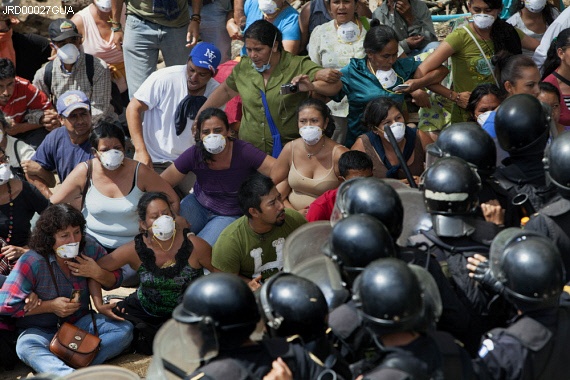
Despite gender discrimination in their own communities, women in Latin America are risking their lives to defend their lands.
Beatriz Olivera researches the effects of the extractives and energy industries in Latin America for the Mexican organisation Fundar, a member of RLIE and Publish What You Pay. In her work, she sees again and again inconsistencies between women and men. Women are seldom allowed to own land. They play a smaller role in making decisions about land use. And women suffer more from the effects of extractive projects than men do.
On 15 October, the International Day of Rural Women, much of the attention will focus on rural gender gaps in poverty, health and the effects of climate change. But in other ways, far from being victims, rural women are consistently at the vanguard of the resistance to the invasion and militarisation of their land by mining and energy companies. From Colombia to Honduras to Mexico, women have worked as organisers and spokespersons. They’ve blocked access roads with boulders, led marches and demanded a seat at the policy table.
“Although they’re fighting and defending their land, they’re defending land that doesn’t belong to them, land that’s owned by men,” Olivera said.
In Latin America, there are few mechanisms by which rural women can acquire land, Olivera said. Just 8 percent of rural women are land owners. And decisions about whether to lease or sell communal lands to extractives companies are made by men, largely owing to pervasive machismo culture. At the policymaking level, women represent a minority of voices in legislatures and board rooms.
Meanwhile, rural women bear a disproportionate share of the burden of extractives activities and fewer of the benefits, like mining jobs or land lease income. While region-wide data is scarce, anecdotes abound. The concentration of male mine workers from out of town corresponds to an increase in prostitution and sex trafficking. Domestic and sexual violence against women increases, often on the part of the extractives companies’ private security forces. If livestock or water sources are killed or contaminated, for instance by cyanide runoff from gold mines, the burden falls on the women to seek alternative provisions.
Against this backdrop of inequality, women have taken the lead in organising the opposition to extractives projects. In Peru, for example, Máxima Acuña won a Goldman Environmental Prize last year for her campaign that in 2015 halted the expansion of a toxic gold mining operation on her land. “I may be poor. I may be illiterate, but I know that our mountain lakes are our real treasure,” she told New Internationalist. “Are we supposed to sit quietly and just let them poison our land and water?”
In Oaxaca, Mexico, a wind farm project went forward after inadequate consultation with the local community. When protesters gathered to reject the construction, armed security fired warning shots toward the crowd and, according to one farmer’s account, held a boy hostage. They let him go only after a group of women charged the guards and dragged the boy away. The villagers have since formed a community organisation to oppose energy projects. “Our land is sacred,” said one mother who belongs to the group.
With alarming frequency, women have risked their lives in the fight. As the assassinations of Berta Cáceres (another Goldman winner) and Margarita Murillo in Honduras gravely illustrate, the fight for conservation and indigenous land rights is perilous work.
“At Fundar, we believe it’s important to document how women organise to protect their lands and to support them,” Olivera said. She’s presently working to document the ways extractives industries disproportionately harm women — and indigenous women in particular — and will release a new report next year on the subject.
Olivera said they’re also bringing together civil society organisations from across Latin America working to defend the rights of rural and indigenous women against both extractives companies and gender discrimination in their own communities.
“Women are playing a key role in defending their lands, even though in most cases they are not the owners of the land,” she says. “It’s now up to policymakers to find a way to provide land rights to women.”
This article is based on the work of our member Fundar, part of RLIE
Join the conversation about rural women and the important role they play for community rights on Twitter with #ruralwomen
Read our guide on how to include gender perspectives into natural resource governance.